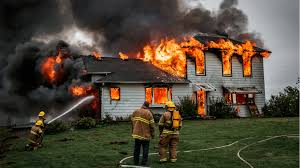 |
| Serkan AYDEMİR |
"Why Do People Die in Fires? Global Experts Decry Lack of Preparedness Despite Tech Advances"
AYDEMİR,SerkanIstanbul, Türkiye – March 8, 2025
Despite rapid technological advancements in construction, healthcare, and hospitality, systemic failures in emergency preparedness continue to claim lives during fires, warns Istanbul-based fire safety expert Serkan Aydemir. In a scathing analysis, Aydemir highlighted the stark gap between innovation and practical safety measures, citing outdated protocols, poorly maintained equipment, and inadequate escape routes as critical vulnerabilities.
“Technology has simplified our lives, but it has not eliminated fire risks. When detection systems fail, extinguishers are missing, and alarms don’t work, deaths become inevitable,” Aydemir stated. He emphasized that while passive and active fire safety systems—such as smoke containment and suppression—can slow a blaze, convective spread of toxic fumes remains the deadliest threat, poisoning victims through inhalation and skin absorption within minutes.
Global Reactions: A Universal Crisis of Complacency
Aydemir’s critique resonates globally. The World Fire Statistics Centre (WFSC) reports that 80% of fire-related deaths occur in buildings lacking compliant safety systems. In the wake of recent hotel fires in South Korea and Brazil, which collectively killed over 120 people, the United Nations has called for stricter enforcement of international building codes. “Complacency kills. Governments and businesses must prioritize human lives over cost-cutting,” said UN Under-Secretary-General for Disaster Risk Reduction, Mami Mizutori.
In the U.S., the National Fire Protection Association (NFPA) flagged that 65% of high-rise buildings inspected in 2024 had non-functional alarms or blocked escape routes. “Escape routes are lifelines. If they’re compromised, even advanced tech won’t save lives,” NFPA spokesperson Lorraine Carli remarked. Meanwhile, the European Union has pledged €500 million to retrofit aging infrastructure in member states, though critics argue progress is sluggish.
Turkey’s Fire Safety Paradox
Turkey, still reeling from the 2023 Antalya hotel fire that killed 34, faces mounting scrutiny. While laws mandate fire risk assessments and emergency drills, enforcement remains inconsistent. “Many businesses perform cursory checks to meet regulations but ignore maintenance. It’s a ticking time bomb,” said Aydemir. His call to “let buildings burn, but save lives” has sparked debate, with some municipalities now prioritizing crowd evacuation plans over costly suppression systems.
The Escape Route Imperative
Aydemir stressed that even without advanced systems, clear, unobstructed escape routes—staircases, corridors, and exits—can drastically reduce casualties. His warnings align with findings from the Global Alliance for Disaster Reduction, which identified poor evacuation planning as a leading factor in fire fatalities.
Corporate Accountability Under Fire
Multinational corporations are also under the lens. Following a deadly factory fire in Bangladesh linked to locked exits, labor rights groups demand binding safety agreements. “Workers shouldn’t have to choose between their jobs and their lives,” said Amnesty International’s Mustafa Qadri.
A Path Forward
Aydemir urges businesses to adopt a four-pillar approach:
Fire Load Analysis: Assessing flammable materials in buildings.
Regular Risk Assessments: Identifying and mitigating hazards.
Emergency Training and Equipment: Ensuring staff can respond effectively.
Crisis Management Protocols: Streamlining evacuations and communication.
“Prevention is ideal, but preparation is non-negotiable,” he concluded.
Global Solidarity, Local Inaction
As wildfires rage in Australia and urban infernos grip Lebanon, Aydemir’s message transcends borders: “Fires test our humanity. Will we invest in saving lives, or keep counting the dead?”
Reporting contributed by Reuters, AP, and the WFSC; Edited for clarity.
This report underscores the universal neglect of fire safety infrastructure, blending local expertise with global data to demand urgent systemic reforms.



No comments:
Post a Comment